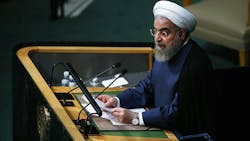Peugot, Airbus to Return to Iran with Sanctions Lifted
PARIS—Iranian President Hassan Rouhani arrived in France on Wednesday for an official visit during which he is expected to sign a host of commercial deals.
The visit, the first to France by an Iranian president since 1999, is the second leg of a trip signaling Tehran's rapprochement with Europe after sanctions were lifted against the Islamic Republic.
Rouhani flew in from Italy, where he sealed industrial deals worth between 15 billion euros and 17 billion euros ($18.5 billion).
Even before he touched down in France, the Iranian transport minister said a deal would be rubber-stamped to buy 114 passenger planes from Airbus.
Rouhani will also ink a deal signaling the return of French carmaker Peugeot to Iran, in partnership with Iranian manufacturer Khodro, according to a French government source.
Peugeot will produce 200,000 vehicles a year beginning in 2017.
When Peugeot pulled out of Iran in 2012 under the weight of the Western sanctions over the country's nuclear program, it was the maker's second biggest market after France.
In another potential business bonanza, French oil giant Total is said to be interested in buying Iranian crude.
Rouhani will have talks with President Francois Hollande and they will hold a joint press conference which is expected to touch on Iran's bitter feud with Saudi Arabia.
The visit had originally been scheduled to take place after the November 13 jihadist attacks on Paris, but was postponed.
The Iranian opposition is expected to hold a human rights demonstration in Paris to coincide with his visit.
Defiance Over Saudi Row
At a press conference rounding off his Rome visit, Rouhani was defiant when asked whether Iran would apologize to Saudi Arabia for an attack on its embassy by demonstrators furious over Riyadh's execution of a prominent Shiite cleric.
It is not up to Iran to make a move towards reconciliation in a crisis that has seen Riyadh cut diplomatic ties with Tehran, he said.
"Why should we apologize, because (activist and Shiite cleric) Nimr al-Nimr was executed? We are the ones to apologize because they are killing the people of Yemen? Apologize to them because they are helping terrorists?" he asked.
"They are the ones who should apologize to Muslim people, hundreds of times."
Rouhani, a 67-year-old former academic and diplomat who is seen as a pragmatist, was elected in 2013 on a pledge to end sanctions and improve relations with the West.
The Iranian leader met with his Italian counterpart Sergio Mattarella and Prime Minister Matteo Renzi, with whom he oversaw the signing of several economic agreements in the prestigious setting of the Campidoglio, or City Hall.
The president is accompanied by a delegation of more than 100 ministers, officials and businessmen, eager to seal deals as Europe's manufacturing and engineering sectors clamour to get into the Iranian market as it opens up.
On Monday, Rouhani attended a business forum at which he portrayed Iran as the ideal base for companies seeking a foothold in a region of 300 million people and reassured would-be investors their contracts would be honored.
"Iran is the safest, the most stable country in the entire region," Rouhani said.
"Everyone understood that the nuclear negotiations represented a win-win situation for both sides.
"Now we have created the conditions for investment and for the transfer of know-how. There has to be an advantage for both sides: we invite you to invest and we will provide stability and ensure that you can make adequate returns."
Rouhani then visited the Vatican for the first time and met Pope Francis, who has urged Iran to work for peace in the Middle East.
Iranian Transport Minister Abbas Akhoundi said Sunday that Tehran would sign a deal "between Iran Air and Airbus" when Rouhani is in Paris. An Airbus spokesman declined to comment.
Rouhani himself said: "We need to modernize our aviation fleet and buy locomotives."
Iran has been rebuilding its relations with Italy and France, which were among Tehran's main economic partners before the tightening of international sanctions in January 2012.
Copyright Agence France-Presse, 2016
About the Author
Agence France-Presse
Copyright Agence France-Presse, 2002-2025. AFP text, photos, graphics and logos shall not be reproduced, published, broadcast, rewritten for broadcast or publication or redistributed directly or indirectly in any medium. AFP shall not be held liable for any delays, inaccuracies, errors or omissions in any AFP content, or for any actions taken in consequence.
